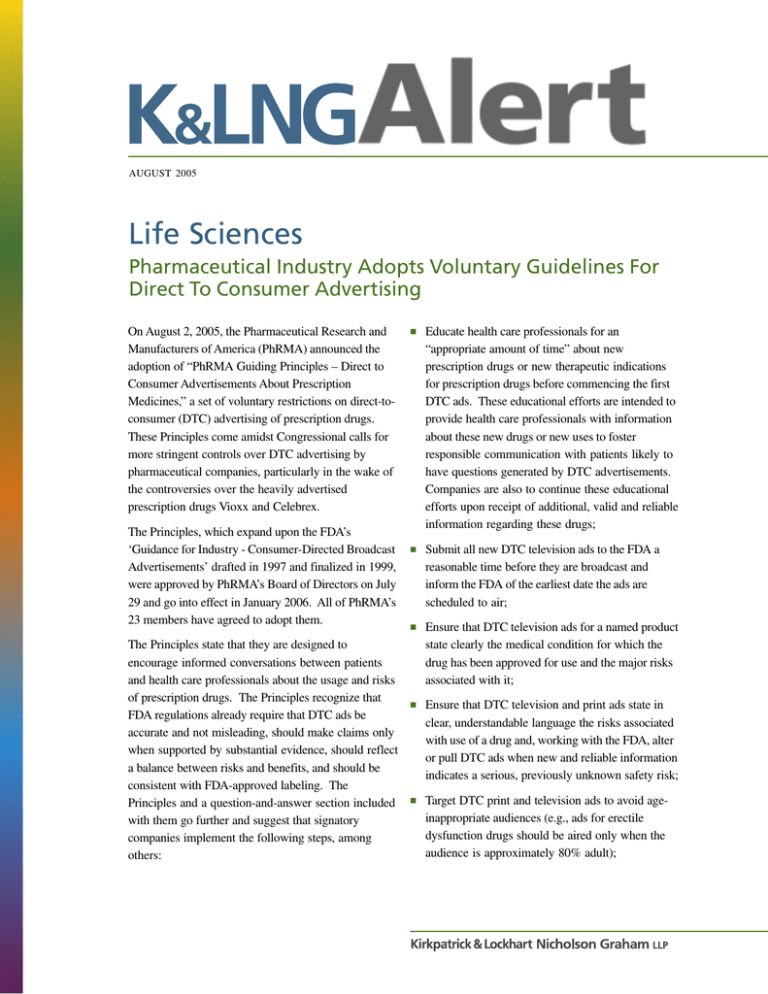
AUGUST 2005
Life Sciences
Pharmaceutical Industry Adopts Voluntary Guidelines For
Direct To Consumer Advertising
On August 2, 2005, the Pharmaceutical Research and
Manufacturers of America (PhRMA) announced the
adoption of “PhRMA Guiding Principles – Direct to
Consumer Advertisements About Prescription
Medicines,” a set of voluntary restrictions on direct-toconsumer (DTC) advertising of prescription drugs.
These Principles come amidst Congressional calls for
more stringent controls over DTC advertising by
pharmaceutical companies, particularly in the wake of
the controversies over the heavily advertised
prescription drugs Vioxx and Celebrex.
The Principles, which expand upon the FDA’s
‘Guidance for Industry - Consumer-Directed Broadcast
Advertisements’ drafted in 1997 and finalized in 1999,
were approved by PhRMA’s Board of Directors on July
29 and go into effect in January 2006. All of PhRMA’s
23 members have agreed to adopt them.
The Principles state that they are designed to
encourage informed conversations between patients
and health care professionals about the usage and risks
of prescription drugs. The Principles recognize that
FDA regulations already require that DTC ads be
accurate and not misleading, should make claims only
when supported by substantial evidence, should reflect
a balance between risks and benefits, and should be
consistent with FDA-approved labeling. The
Principles and a question-and-answer section included
with them go further and suggest that signatory
companies implement the following steps, among
others:
■
Educate health care professionals for an
“appropriate amount of time” about new
prescription drugs or new therapeutic indications
for prescription drugs before commencing the first
DTC ads. These educational efforts are intended to
provide health care professionals with information
about these new drugs or new uses to foster
responsible communication with patients likely to
have questions generated by DTC advertisements.
Companies are also to continue these educational
efforts upon receipt of additional, valid and reliable
information regarding these drugs;
■
Submit all new DTC television ads to the FDA a
reasonable time before they are broadcast and
inform the FDA of the earliest date the ads are
scheduled to air;
■
Ensure that DTC television ads for a named product
state clearly the medical condition for which the
drug has been approved for use and the major risks
associated with it;
■
Ensure that DTC television and print ads state in
clear, understandable language the risks associated
with use of a drug and, working with the FDA, alter
or pull DTC ads when new and reliable information
indicates a serious, previously unknown safety risk;
■
Target DTC print and television ads to avoid ageinappropriate audiences (e.g., ads for erectile
dysfunction drugs should be aired only when the
audience is approximately 80% adult);
■
Establish internal processes to ensure compliance
with the Principles.
Under the Principles, PhRMA will also establish an
Office of Accountability to receive comments from the
public and health care professionals regarding DTC
ads by signatory companies, which includes any
company which publicly states that it will follow the
Principles. It will provide comments reasonably
related to compliance with the Principles to the
affected companies and will issue periodic reports to
the FDA and to the public regarding the nature of the
comments received and company responses. In
January 2007, the Office of Accountability will also
appoint an independent panel to review the prior
year’s reports, examine trends in the industry relating
to the Principles, and make recommendations in
accordance with the Principles.
Life Sciences clients should pay close attention to the
Principles and to what happens next. Even though the
Principles will be followed by PhRMA members,
which include some of the country’s largest
pharmaceutical manufacturers, it is nonetheless
difficult to assess how the Principles will work in
practice, as several interpretative and implementation
issues remain. For instance, there is no set period over
which a company must educate health care
professionals about new drugs or uses before
broadcasting DTC ads. That “appropriate time” is to
be determined by each company in light of factors
identified in the Principles, which include the
importance of alerting patients of the availability of
the new drug, the complexity of its risk-benefit profile,
and the health care field’s knowledge of the condition
being treated.
Nor is it possible to predict Congressional response to
the Principles and, in particular, what effect they may
have in forestalling further government action.
Senate Majority Leader Bill Frist had sought a
voluntary two-year moratorium on new drug
advertising. Although the Principles do not call for
such a moratorium, two PhRMA members have at least
adopted the concept — Bristol-Meyers Squibb
announced it will hold off on DTC ads for a minimum
of 12 months following a new product launch, and
Pfizer announced it will not begin DTC ads for new
drugs for at least six months.
Frist has called on the Government Accountability
Office to study of the FDA’s oversight of DTC
advertising. For its part, the FDA, according to
published reports, is expected to review its regulations
governing DTC advertising.
ABOUT K&LNG’S BIOPHARMA COMPLIANCE
TASK FORCE
As the above suggests, the already treacherous legal
landscape confronting the pharmaceutical,
biotechnology, health care and medical device
industries is changing. K&LNG’s Life Sciences
practice group was formed to assist clients in
addressing these and other legal issues confronting
these industries.
To better serve these clients, the Life Sciences practice
group announces the creation of the BioPharma
Compliance Task Force. The Task Force is comprised
of corporate, regulatory, white collar criminal defense
and trial lawyers. It is designed to address
comprehensively the increasing regulatory oversight
and the ever-present risk of civil and criminal
investigation and enforcement of an array of federal
and state standards in the biotech, pharmaceutical,
health care and medical device fields.
Eileen Smith Ewing
671.951.9227
eewing@klng.com
Michael D. Ricciuti
617.951.9094
mricciuti@klng.com
2 AUGUST 2005
KIRKPATRICK & LOCKHART NICHOLSON GRAHAM LLP
If you have questions about K&LNG’s BioPharma Compliance Task Force, please contact one of our
lawyers listed below:
BOSTON
Eileen Smith Ewing
Michael D. Ricciuti
John A. Wortmann, Jr.
Michael DeMarco
Barbara A. Jones
617.951.9227
617.951.9094
617.951.9095
617.951.9111
617.951.9096
eewing@klng.com
mricciuti@klng.com
jwortmann@klng.com
mdemarco@klng.com
barbara.jones@klng.com
NEWARK
John A. Azzarello
John J. Farmer, Jr.
973.848.4126
973.848.4021
jazzarello@klng.com
jfarmer@klng.com
MIAMI
William J. Spratt, Jr.
305.539.3320
wspratt@klng.com
www
w.. k l n g . c o m
BOSTON DALLAS HARRISBURG LONDON LOS ANGELES MIAMI NEWARK NEW YORK PALO ALTO PITTSBURGH SAN FRANCISCO WASHINGTON
■
■
■
■
■
■
■
■
■
■
■
Kirkpatrick & Lockhart Nicholson Graham LLP (K&LNG) has approximately 1,000 lawyers and represents entrepreneurs, growth and middle market companies , capital markets participants, and
leading FORTUNE 100 and FTSE 100 global corporations nationally and internationally.
K&LNG is a combination of two limited liability partnerships, each named Kirkpatrick & Lockhart Nicholson Graham LLP, one qualified in Delaware, U.S.A. and practicing from offices in Boston,
Dallas, Harrisburg, Los Angeles, Miami, Newark, New York, Palo Alto, Pittsburgh, San Francisco and Washington and one incorporated in England practicing from the London office.
This publication/newsletter is for informational purposes and does not contain or convey legal advice. The information herein should not be used or relied upon in regard to any particular facts
or circumstances without first consulting a lawyer.
Data Protection Act 1988 - We may contact you from time to time with information on Kirkpatrick & Lockhart Nicholson Graham LLP seminars and with our regular newsletters, which may be of
interest to you. We will not provide your details to any third parties. Please e-mail cgregory@klng.com if you would prefer not to receive this information.
© 2005 KIRKPATRICK & LOCKHART NICHOLSON GRAHAM LLP. ALL RIGHTS RESERVED.





